|
De Nederlandse schrijfster Renate Dorrestein werd geboren in Amsterdam op 25 januari 1954.Zie ook alle tags voor Renate Dorrestein op dit blog.
Uit:Weerwater
“Het rode lampje van de reservetank lichtte op toen ik mijn auto startte. Op goed geluk reed ik de wijk uit terwijl het zweet in mijn ogen droop. Ik had op de kaart moeten kijken, ik had geen idee hoe ik zonder navigatie op een van de stadsdreven kwam die naar de snelweg leidden. Knarsetandend van de spanning sloeg ik willekeurig linksaf, rechtsaf.
Doordat ik niets snapte van Almeres gescheiden verkeersstromen belandde ik plotseling op een vrije busbaan. Ik kon er niet meer af, het leek alsof ik kilometerslang over y-overs en viaducten reed. Paniek sneed me de adem af totdat ik bij een overgang mijn kans schoonzag en ik mijn auto met een onmogelijk krappe draai weer op een gewone weg wist te krijgen. Ik zeilde over een rotonde en kon mijn geluk niet geloven: ik kwam uit op de Hogering, een van de grote doorgaanswegen. Maar daar sloeg de motor af. Vloekend, biddend en machteloos op mijn stuur slaand kon ik nog net de vluchtstrook bereiken. Ik greep mijn handtas en mijn laptop en sloeg het portier achter me dicht.
Hete lucht verplaatsend raasden volgepakte auto’s aan me voorbij. Niemand leek me te zien staan. Of niemand wilde tijd verspillen door te stoppen. Weg, weg, weg van hier!
De middagzon brandde op mijn blote armen. Ik werd dizzy van de warmte. Ik had iets moeten eten.
Net toen ik dacht dat ik in tranen zou uitbarsten, reed er een grote truck met een Belgisch nummerbord de vluchtstrook op. Ik was nog nooit in zo’n gevaarte geklauterd, ik kwam de treeplank amper op. Ik voelde ineens dat ik een vrouw van boven de zestig was, strammer en brozer dan onder deze omstandigheden wenselijk was.
De vrachtwagenchau‑ eur, een man met een goedig gezicht, begon meteen tegen me te kletsen. Hij zei dat hij Lammert heette, Lammert Verweghe, en dat hij zich niet liet gekmaken door die verhalen over een mistbank. ‘Mijn camion geraakt er wel doorheen. Ik ga niet nog een dag vermorsen.’
Ik herademde. Nog even en deze nachtmerrie zou voorbij zijn. In mijn tas vond ik Maartens zakdoek. Ik snoot mijn neus. Nooit van mijn levensdagen zette ik meer een stap in Almere.”
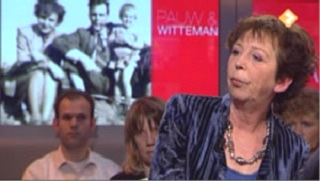
Renate Dorrestein (Amsterdam, 25 januari 1954)
De Amerikaanse schrijver en regisseur Stephen Chbosky werd geboren op 25 januari 1970 in Pittsburgh, Pennsylvania. Zie ook alle tags voor Stephen Chbosky op dit blog.
Uit: The Perks of Being a Wallflower
“She took me to her room and stood me in front of her dresser, which was covered in a pillowcase with pretty colors. She lifted off the pillowcase, and there I was, standing in my old suit, looking at an old typewriter with a fresh ribbon. Inside the typewriter was a piece of white paper.
On that piece of white paper, Sam wrote, "Write about me sometime." And I typed something back to her, standing right there in her bedroom. I just typed.
"I will."
And I felt good that those were the first two words that I ever typed on my new old typewriter that Sam gave me. We just sat there quiet for a moment, and she smiled. And I moved to the typewriter again, and I wrote something.
"I love you, too."
And Sam looked at the paper, and she looked at me.
"Charlie . . . have you ever kissed a girl?"
I shook my head no. It was so quiet.
"Not even when you were little?"
I shook my head no again. And she looked very sad.
She told me about the first time she was kissed. She told me that it was with one of her dad's friends. She was seven. And she told nobody about it except for Mary Elizabeth and then Patrick a year ago. And she started to cry. And she said something that I won't forget. Ever.
"I know that you know that I like Craig. And I know that I told you not to think of me that way. And I know that we can't be together like that. But I want to forget all those things for a minute. Okay?"
"Okay."

Stephen Chbosky (Pittsburgh, 25 januari 1970)
Scene uit de film uit 2012 met Emma Watson en Logan Lerman
De Engelse schrijver William Somerset Maugham werd geboren in Parijs op 25 januari 1874. Zie ook alle tags voorWilliam Somerset Maugham op dit blog.
Uit: The Making of a Saint
'Allow me to present to you my friend Filippo Brandolini, a gentleman of Città di Castello.'
Then, turning to me, Matteo added, 'This is my cousin, Checco d'Orsi.'
Checco d'Orsi smiled and bowed.
'Messer Brandolini,' he said, 'I am most pleased to make your acquaintance; you are more than welcome to my house.'
'You are very kind,' I replied; 'Matteo has told me much of your hospitality.'
Checco bowed courteously, and asked his cousin, 'You have just arrived, Matteo?'
'We arrived early this morning. I wished to come here directly, but Filippo, who suffers from a very insufferable vanity, insisted on going to an inn and spending a couple of hours in the adornment of his person.'
'How did you employ those hours, Matteo?' asked Checco, looking rather questioningly at his cousin's dress and smiling.
Matteo looked at his boots and his coat.
'I am not elegant! But I felt too sentimental to attend to my personal appearance, and I had to restore myself with wine. You know, we are very proud of our native Forli wine, Filippo.'
'I did not think you were in the habit of being sentimental, Matteo,' remarked Checco.
'It was quite terrifying this morning, when we arrived,' said I; 'he struck attitudes and called it his beloved country, and wanted to linger in the cold morning and tell me anecdotes about his childhood.'
'You professional sentimentalists will never let anyone sentimentalise but yourselves.'
'I was hungry,' said I, laughing, 'and it didn't become you. Even your horse had his doubts.'
'Brute!' said Matteo. 'Of course, I was too excited to attend to my horse, and he slipped over those confounded stones and nearly shot me off—and Filippo, instead of sympathising, burst out laughing.'
'Evidently you must abandon sentiment,' said Checco.
'I'm afraid you are right. Now, Filippo can be romantic for hours at a stretch, and, what is worse, he is—but nothing happens to him. But on coming back to my native town after four years, I think it was pardonable.'
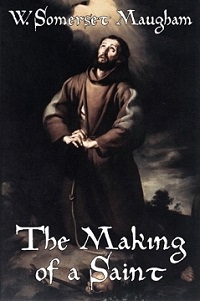
William Somerset Maugham (25 januari 1874 – 16 december 1965)
Cover
De Engelse schrijfster Virginia Woolf werd geboren op 25 januari 1882 te Londen. Zie ook alle tags voor Virginia Woolf op dit blog.
Uit: A room of one's own
“That, more or less, is how the story would run, I think, if a woman in Shakespeare’s day had had Shakespeare’s genius. But for my part, I agree with the deceased bishop, if such he was—it is unthinkable that any woman in Shakespeare’s day should have had Shakespeare’s genius. For genius like Shakespeare’s is not born among labouring, uneducated, servile people. It was not born in England among the Saxons and the Britons. It is not born to–day among the working classes. How, then, could it have been born among women whose work began, according to Professor Trevelyan, almost before they were out of the nursery, who were forced to it by their parents and held to it by all the power of law and custom? Yet genius of a sort must have existed among women as it must have existed among the working classes. Now and again an Emily Brontë or a Robert Burns blazes out and proves its presence. But certainly it never got itself on to paper. When, however, one reads of a witch being ducked, of a woman possessed by devils, of a wise woman selling herbs, or even of a very remarkable man who had a mother, then I think we are on the track of a lost novelist, a suppressed poet, of some mute and inglorious Jane Austen, some Emily Brontë who dashed her brains out on the moor or mopped and mowed about the highways crazed with the torture that her gift had put her to. Indeed, I would venture to guess that Anon, who wrote so many poems without singing them, was often a woman. It was a woman Edward Fitzgerald, I think, suggested who made the ballads and the folk–songs, crooning them to her children, beguiling her spinning with them, or the length of the winter’s night.
This may be true or it may be false—who can say?—but what is true in it, so it seemed to me, reviewing the story of Shakespeare’s sister as I had made it, is that any woman born with a great gift in the sixteenth century would certainly have gone crazed, shot herself, or ended her days in some lonely cottage outside the village, half witch, half wizard, feared and mocked at. For it needs little skill in psychology to be sure that a highly gifted girl who had tried to use her gift for poetry would have been so thwarted and hindered by other people, so tortured and pulled asunder by her own contrary instincts, that she must have lost her health and sanity to a certainty. No girl could have walked to London and stood at a stage door and forced her way into the presence of actor–managers without doing herself a violence and suffering an anguish which may have been irrational—for chastity may be a fetish invented by certain societies for unknown reasons—but were none the less inevitable. Chastity had then, it has even now, a religious importance in a woman’s life, and has so wrapped itself round with nerves and instincts that to cut it free and bring it to the light of day demands courage of the rarest."
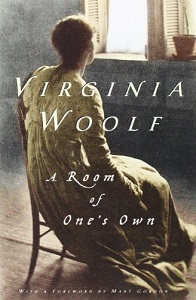
Virginia Woolf (25 januari 1882 – 28 maart 1941)
Cover
De Israëlische schrijver David Grossman werd geboren op 25 januari 1954 in Jeruzalem. Zie ook alle tags voor David Grossman op dit blog.
Uit: To the End of the Land (Vertaald door Jessica Cohen)
“Within the commotion Ora swiftly picks up the distant chatter of a baby somewhere in the large gathering ground, and the voice of his mother answers sweetly. She stands for a moment looking for them but cannot find them, and she imagines the mother changing the baby’s diaper, maybe on the hood of a car, bending over and tickling his tummy, and she stands slightly stooped, hugging her suede bag to her body, and laps up the soft double trickle of sounds until it vanishes.
It is all a huge, irredeemable mistake. It seems to her that as the moment of separation approaches, the families and the soldiers fill with arid merriment, as if they have all inhaled a drug meant to dull their comprehension. The air bustles with the hum of a school trip or a big family excursion. Men her age, exempt from reserve duty, meet their friends from the army, the fathers of the young soldiers, and exchange laughter and backslaps. “We’ve done our part,” two stout men tell each other, “now it’s their turn.” Television crews descend on families saying goodbye to their loved ones. Ora is thirsty, parched. Half running, she trails behind Ofer. Every time her gaze falls on the face of a soldier she unwittingly pulls back, afraid she will remember him: Ofer once told her that when they had their pictures taken sometimes, before they set off on a military campaign, the guys made sure to keep their heads a certain distance from each other, so there’d be room for the red circle that would mark them later, in the newspaper. Screeching loudspeakers direct the soldiers to their battalions’ meeting points— a meetery, they call this, and she thinks in her mother’s voice: barbarians, language-rapists—and suddenly Ofer stops and she almost walks into him. He turns to her and she feels a deluge. “What’s the matter with you?” he whispers into her face. “What if they find an Arab here and think he’s come to commit suicide? And didn’t you think about how he feels having to drive me here? Do you even get what this means for him?”
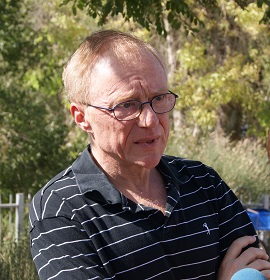
David Grossman (Jeruzalem, 25 januari 1954)
De Iers-Britrse schrijver James Gordon Farrell werd geboren op 25 januari 1935 in Liverpool. Zie ook alle tags voor J. G. Farrell op dit blog.
Uit:The Singapore Grip
“The city of Singapore was not built up gradually, the way most cities are, by a natural deposit of commerce on the banks of some river or at a traditional confluence of trade routes. It was simply invented one morning early in the nineteenth century by a man looking at a map. ‘Here,’ he said to himself, ‘is where we must have a city, half-way between India and China. This will be the great halting-place on the trade route to the Far East. Mind you, the Dutch will dislike it and Penang won’t be pleased, not to mention Malacca.’ This man’s name was Sir Thomas Stamford Raffles: before the war his bronze statue used to stand in Empress Place in a stone alcove like a scallop shell (he has been moved along now and, turned to stone, occupies a shady spot by the river). He was by no means the lantern-jawed individual you might have expected: indeed, a rather vague-looking man in a frock coat.
Although people had once lived there, the island of Singapore, when he arrived, was largely deserted except for a prodigious quantity of rats and centipedes. Rather ominously, Raffles also noticed a great many human skulls and bones, the droppings of local pirates. He wasted no time, however, in negotiating for the island with an alarmed native and then proceeded, his biographer tells us, to set up a flag-pole thirty-six feet high. ‘Our object,’ he wrote in a letter to a friend, ‘is not territory but trade: a great commercial emporium, and a fulcrum, whence we may extend our influence politically as circumstances may hereafter require.’ As he stood there on that lonely beach and gazed up at the flag with rats and centipedes seething and tumbling over his shoes did Raffles foresee the prosperity which lay ahead for Singapore? Undoubtedly he did.
When you think ofthe city as it was forty years ago you should not imagine an uncivilised frontier-town of the jungle. You had only to stroll around the centre of the city with its wide avenues and lawns and look at the monolithic government buildings, at the luxurious department stores and at the marmoreal dignity of the banks, to realise that Singapore was the work of a great and civilised nation. True, there were other parts of the city, the various native quarters where Tamils, Malays, and above all the Chinese lived, which were rather less imposing."
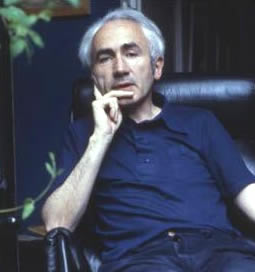
J. G. Farrell (25 januari 1935 – 11 augustus 1979)
De Italiaanse schrijver Alessandro Baricco werd geboren op 25 januari 1958 in Turijn. Zie ook alle tags voor Alessandro Baricco op dit blog.
Uit: De barbaren (Vertaald door Manon Smits)
“De barbaren, daar heb je ze.
Welnu: in mijn wereld is intellectuele eerlijkheid schaars, maar intelligentie niet. Niet iedereen is gek geworden. Ze zien iets wat er is.
Alleen krijg ik het niet voor elkaar om datgene wat er is te bekijken met diezelfde blik. Er zit me iets niet lekker.
Ik realiseer me terdege dat het ook gewoon het normale conflict tussen de generaties zou kunnen zijn, de ouderen die zich verzetten tegen de invasie van de jongeren, de gevestigde macht die zijn posities verdedigt door de opkomende krachten te beschuldigen van barbaarsheid, en al die dingen die altijd al hebben plaatsgevonden en die we al duizenden keren hebben gezien. Maar deze keer lijkt het anders.
Het conflict zit zo diep dat het anders lijkt. Gewoonlijk wordt er gevochten om zeggenschap over strategische punten op de landkaart. In dit geval lijkt het echter veel radicaler, alsof de aanvallers veel verder gaan: ze zijn de landkaart aan het veranderen. Misschien hebben ze hem zelfs al veranderd. Zoiets moet er gebeurd zijn in de gezegende jaren waarin bijvoorbeeld de Verlichting opkwam, of in de dagen waarin de hele wereld ineens romantisch bleek te zijn geworden. Er waren geen troepenverplaatsingen, en ook geen zonen die hun vaders vermoordden. Ze waren mutanten, die het ene landschap vervingen voor een ander, en daar hun eigen habitat vestigden.
Misschien is dit ook zo’n moment. En zijn degenen die wij barbaren noemen een nieuwe soort, met kieuwen achter de oren, die heeft besloten om onder water te leven. Nogal Wiedes dat wij, van buitenaf, met onze longetjes, dat bekijken als een dreigende apocalyps. Waar zij ademhalen, gaan wij dood.”
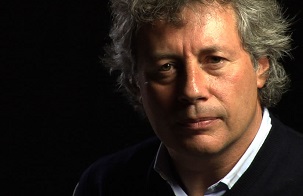
Alessandro Baricco (Turijn, 25 januari 1958)
De Schotse dichter Robert Burns werd geboren op 25 januari 1759 in Alloway, Ayrshire. Zie ook alle tags voor Robert Burns op dit blog.
A Winter Night
When biting Boreas, fell and doure,
Sharp shivers thro' the leafless bow'r;
When Phoebus gies a short-liv'd glow'r,
Far south the lift,
Dim-dark'ning thro' the flaky show'r,
Or whirling drift:
Ae night the storm the steeples rocked,
Poor Labour sweet in sleep was locked,
While burns, wi' snawy wreeths upchoked,
Wild-eddying swirl,
Or thro' the mining outlet bocked,
Down headlong hurl.
List'ning, the doors an' winnocks rattle,
I thought me on the ourie cattle,
Or silly sheep, wha bide this brattle
O' winter war,
And thro' the drift, deep-lairing, sprattle,
Beneath a scar.
Ilk happing bird, wee, helpless thing!
That, in the merry months o' spring,
Delighted me to hear thee sing,
What comes o' thee?
Whare wilt thou cow'r thy chittering wing
An' close thy e'e?
Ev'n you on murd'ring errands toil'd,
Lone from your savage homes exil'd,
The blood-stain'd roost, and sheep-cote spoil'd
My heart forgets,
While pityless the tempest wild
Sore on you beats.
Epitaph On A Noted Coxcomb
LIGHT lay the earth on Billy's breast,
His chicken heart so tender;
But build a castle on his head,
His scull will prop it under.
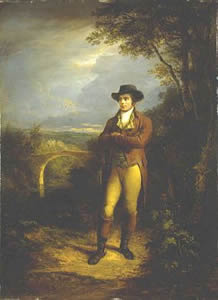
Robert Burns (25 januari 1759 – 21 juli 1796)
Portret door Alexander Nasmyth, 1828
De Finse dichter, toneelschrijver en uitgever Paavo Juhani Haavikko werd geboren in Helsinki op 25 januari 1931. Zie ook alle tags voor Paavo Haavikko op dit blog.
Uit: No. That’s to say, yes
Anyone can be trained to become a president or a used car salesman.
But the sale of a used car requires a worldview and an understanding of the
client. Propaganda, on the other hand, requires dullness and repetition
when everything you are trying to say is used against you.
To listen to silence. It is the organ of propaganda, changing the mind
like a drop of water, as it keeps repeating over and over again.
When it is a question of Finland, the answer is Russia. There is no other
way to ask. You can answer whatever.
Only after the answer has been received, the question is clarified.
There is no question without an answer.
There is no answer without a question, and without knowing the
question you cannot understand the answer.
But it has always been our habit to ask the question ourselves,
then answer it ourselves.
That is the only way to gain scientifically valid answers.
Therefore, questions must be constructed with exactitude, to prevent
their turning into answers.
Vertaald door Anselm Hollo
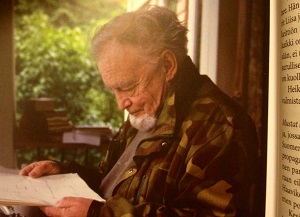
Paavo Haavikko (25 januari 1931 – 6 oktober 2008)
Zie voor nog meer schrijvers van de 25e januari ook mijn blog van 25 januari 2015 deel 2 en eveneens deel 3.
25-01-2017 om 19:00
geschreven door Romenu 
Tags:Renate Dorrestein, Stephen Chbosky, William S. Maugham, Virginia Woolf, David Grossman, J. G. Farrell, Alessandro Baricco, Robert Burns, Paavo Haavikko, Romenu
|

